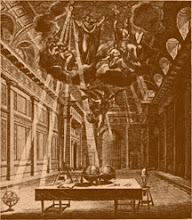I believe that the Craft of Ancient Freemasonry is the most important fraternity ever to appear in
My transformation came about in the last 3 years, after recovering from a tumultuous 2 years as Master, struggling to keep my Lodge with a history of over two hundred years together, and pruning some poisoned branches from the tree. I had some time to reflect upon the meaning of the words which compose our Masonic ritual. I learned, studied and in time, understood. What finally struck me like a bolt of lightning was the practical wisdom contained in Freemasonry. Masons believe in God, the immortality of the soul and the paramount importance of good character. We really are builders who believe that if we construct lives of good character, the Supreme Architect of the Universe will reward us with "a glorious immortality" for our souls. To all regular Freemasons this expresses profound truth.
Indeed, as a fraternity, we do have our secrets--but it is these very secrets which reveal to us the tenets of our Craft. In turn, these tenets set the standard of good character by which we live and display to the world as how we conduct ourselves as Freemasons. How well we accomplish this determines the success of the fraternity.Freemasonry has an exceptional past, one that all Freemasons can be extremely proud of. It has always impressed me that during the 18th century, Mozart, who lived in
What are the tenets of Freemasonry? There are many, but here are a few examples, which are stated clearly in the Third Degree.
• We must not have two personalities--one for private and another for public.
• We must treat women the same way we want other men to treat our sisters.
• We must use the same language before women as we do before men.
• We must make the best and the most of ourselves.
• Above all, we are told to make sure "others know always that a gentleman stands before them."
I'll bet that George Washington lived by our tenets. Today, his life is known throughout much of the world. Why? He lived it as a Freemason. I am certain he demanded respect from his neighbor, just as I'll bet he first earned his neighbor's respect. There was nothing more intolerable in his sight than the letting down of himself to a lower level. He must have bid men come up to him, refusing to descend a single step to them, or he would never have been America's first and greatest leader--the man whom this country still reveres today, 200 years after his death; the great Freemason, who led this country through its struggle for independence.
The more I observe the world and study history, the more I learn about our beloved Craft, the more I am convinced that this Nation is the great country that it is because many of its original thinkers, so many of its first serious citizens were Freemasons. Thomas Jefferson, John Adams and John Carroll may not have been Freemasons, but they conversed with George Washington, Benjamin Franklin, John Hancock, Robert Livingston and others who were Freemasons. And the Freemasons’ influence "passing through and to those whom that circle may surround" refined and shaped the path that our Founding Fathers chose.
Think about it: just because not all of
Pride in Freemasonry is really what this is all about. Pride in being a member of the Craft, expressed by us as individuals to all men by our actions cannot help but attract good men to our fraternity. By making the most and best of ourselves, each and every one of us will be doing the most and best for our families, our communities, our country and Freemasonry.
Used by permission of the author.


No comments:
Post a Comment